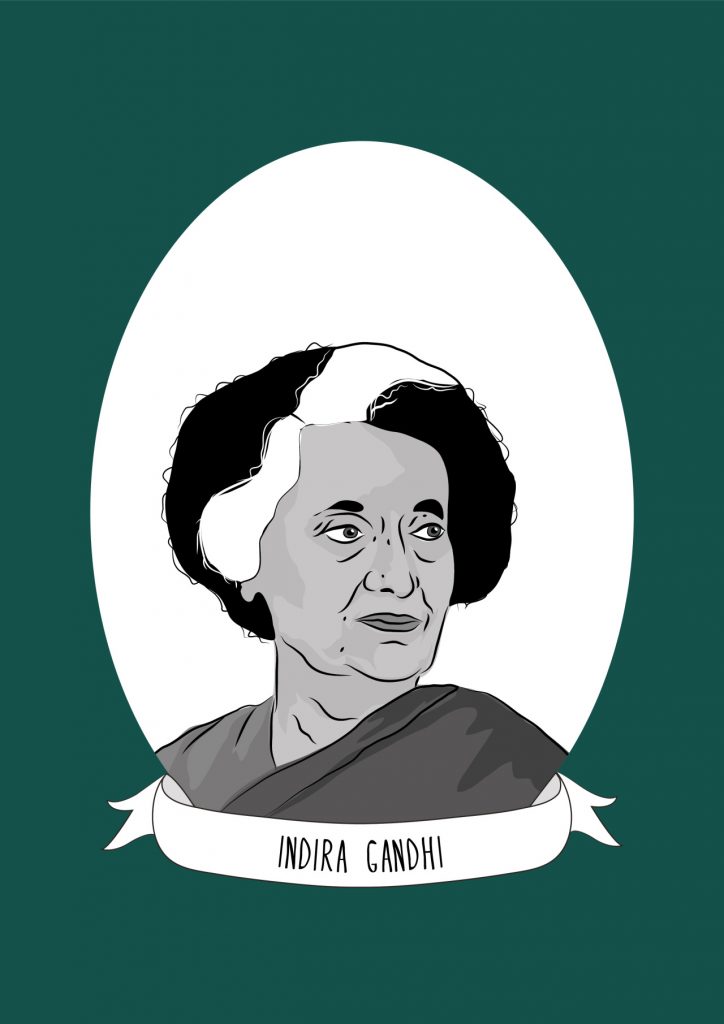Indira Gandhi was the first female Prime Minister of India and central figure of the Indian National Congress party. She was assassinated in 1984.
Gandhi (born Indira Nehru) was the only child of Jawaharlal Nehru. Nehru was one of the chief figures in India’s campaign for independence from Britain along with her grandfather Motilal Nehru. Jawaharlal Nehru was a top leader of the Indian National Congress and the first Prime Minister of independent India.
Gandhi had an unhappy childhood, her father was often busy with politics and her mother suffered from ill health, often leaving her bed-ridden. She began her education being taught at home by tutors, but occasionally attended a variety of schools including the Ecole Internationale in Geneva. Gandhi then attended the Viswa Bharati University in Shantiniketan for a year before having to leave to join her mother in Europe due to her ailing health. Gandhi continued her education at the University of Oxford in England where she studied history, political science and economics but left before completing her studies due to a combination of ill health and the Nazi occupation of Europe. In 1942 at age 25 she married Feroze Gandhi, becoming Indira Gandhi.
In 1938 Gandhi had joined the Congress Party, when they came to power in 1947 and her father took office. In 1955 she became a member of it’s working committee and in 1959 she was elected to the honorary post of party president. She was then elected to the Rajya Sabha (upper chamber of the Indian parliament) in 1964, the same year she was named minister of information and broadcasting by Lal Bahadur Shastri, who succeeded Nehru as prime minister.
Shastri died suddenly in 1966 and Gandhi was named leader of the Congress party, becoming Prime Minister. She was a strong leader, sacking some of highest-ranking officials and bringing about great change in agricultural programs that improved the lives of a large majority of country’s poor. For a time, she was hailed as a hero. Gandhi was constantly challenged by from the right wing of the party and in 1969 she was dismissed from the party by Desai, her deputy prime minister.
Gandhi regrouped, and joined by a majority of party members formed the “New” Congress Party which won a sweeping electoral victory over a coalition of conservative parties in 1971. That same year, the Pakistan army conducted violent acts against the people of East Pakistan, which resulted in nearly 10 million people fleeing to India. Gandhi invited the Pakistani president to Shimla for a week-long summit which culminated in the two leaders signing the Shimla Agreement. Her work eventually led to the creation of the new and independent nation of Bangladesh and she was the first government leader to recognise the new country. She was hailed as Goddess Durga by opposition leader Atal Bihari Vajpayee.
Gandhi ruled with an authoritarian hand and there was corruption within her congress and her national and state governments. In 1977, the high courts found her guilty of a minor infraction during the year’s elections and called for her resignation. Gandhi responded by requesting that the president call for a state of emergency, this lasted 21-months. She imprisoned her political opponents and assumed emergency powers, all while Indians’ constitutional rights were restricted. Public opposition to her emergency rule was widespead and at its end in 1977 she and her party were defeated. She was briefly imprisoned on charged of political corruption.
In the election in 1980 she was re-elected to a fourth term. During this time she was faced with threats to the political integrity of India. In 1982 a large number of Sikhs separatists who were calling for Punjab state to become autonomous, occupied and fortified the Harmandir Sahib (Golden Temple) complex at Amritsar, the Sikhs’ holiest shrine. The tension between government and the Sikhs escalated and in June 1984, under Gandhi’s orders the Indian army attacked the separtists with the intention of removing them from the complex. Around 450 Sikhs were killed and some of the buildings in the shrine were badly damaged.
Five months later on On October 31, 1984 one of Gandhi’s trusted bodyguards, who was a Sikh shot her point-blank. Another Sikh bodyguard shot 30 rounds into her body, the acts as revenge for the attack in Amritsar. She died on the way to the hospital.
In 2011, the Bangladesh Freedom Honour (Bangladesh Swadhinata Sammanona) Bangladesh’s highest civilian award, was posthumously conferred on Indira Gandhi for her outstanding contributions to Bangladesh’s Liberation War. The Indira Awaas Yojana, a central government low-cost housing programme for the rural poor, is named after her.

